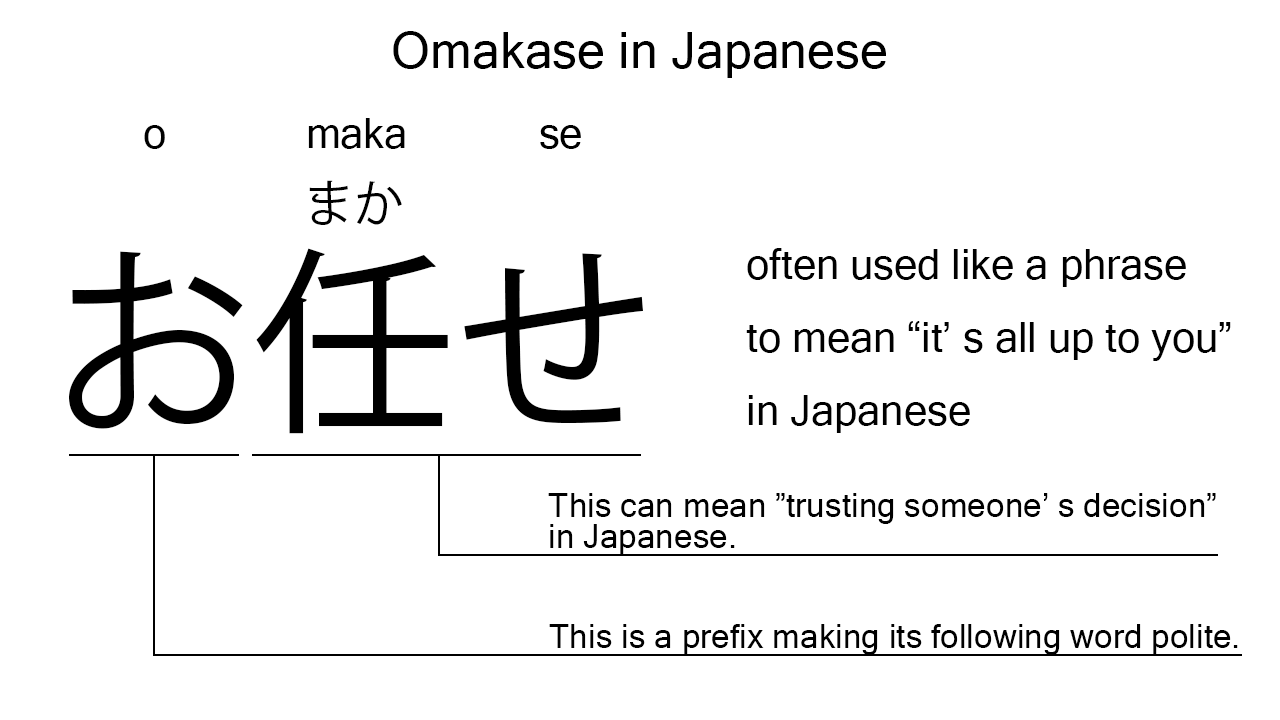What does “omakase” mean in Japanese?
Native speakers say “omakase” often to mean “it’s all up to you” in Japanese. Perhaps, some Japanese learners know this word as it is sometimes used in Japanese conversations. In this blog post, however, I will explain it in detail based on its grammatical components. And also, I will explain how to use it through example sentences. My explanations would help Japanese learners understand “omakase” more clearly. Then, let’s get started!
Contents
Definition and meanings of “omakase”
Let me start with the definition and meanings of “omakase”.
- omakase – お任せ (おまかせ) : a noun occasionally meaning “someone’s choice”, but often used like a phrase to mean “it’s all up to you” in Japanese.
Native speakers use this noun often like a phrase to mean “it’s all up to you” in Japanese. It’s also worth mentioning here that some Japanese restaurants use this noun to refer to the chef’s choice.
The definition and meanings are not that difficult, I think. To understand this noun more clearly, however, let me explain its grammatical components in detail, one by one.
What does “omakase” literally mean in Japanese?
“Omakase” consists of the following two components:
- o – お : a prefix making its following word polite.
- makase – 任せ (まかせ) : can be considered as the noun form of the verb, “makaseru”, which means “to trust someone’s decision” or “to leave something to someone” in Japanese.
From these two components, we can understand that the formed noun is literally the polite expression for trusting someone’s decision or leaving something to someone. This literal interpretation is not completely in line with the actual meanings, but still understandable, I think. Japanese native speakers mean “it’s all up to you” by literally saying “I trust your decision”.

When we meet new Japanese words, we should check their grammatical components in detail to understand their meanings clearly and deeply. In many cases, components tell us a lot about the meanings of the words they form. Actually, here, we could get the better understanding of “omakase” through the detailed check above.
So far, I’ve explained the definition and meanings of “omakase” together with its grammatical components. Then, let me explain how to use it through the example sentences below.
Example #1: how to say “it’s all up to you” in Japanese
kanojo wa yoku 「omakase」 to iu – 彼女はよく「おまかせ」と言う (かのじょはよく「おまかせ」という)
She often says “it’s all up to you.”
Below are the new words used in the example sentence.
- kanojo – 彼女 (かのじょ) : a pronoun meaning ‘she’ in Japanese.
- wa – は : a binding particle working as a case marker or topic marker. In the example, this works after “kanojo” to make the subject in the sentence.
- yoku – よく : an adverb of frequency meaning ‘often’ or such in Japanese.
- to – と : a case particle working as a quote marker or topic marker. In the example, this works after the clause to indicate what she often says.
- iu – 言う (いう) : a verb meaning ‘to say’ in Japanese.
This is a typical usage of “omakase”. In this example, it works like a phrase to mean “it’s all up to you” in Japanese. It has the kanji expression, but is often written in hiragana like this. It’s worth knowing, I think.
Example #2: another usage of “omakase”
watashi mo tokidoki 「omakase desu」 to iu – 私も時々「おまかせです」と言う (わたしもときどき「おまかせです」という)
I sometimes say “it’s all up to you,” too.
Below are the new words used in the example sentence.
- watashi – 私 (わたし) : a pronoun meaning ‘I’ in Japanese.
- mo – も : a binding particle making the subject word or the object word in a sentence with adding the meaning of ‘too’, ‘also’, or ‘as well’. In the example, this works after “watashi” to make the subject in the sentence with adding the meaning of ‘too’.
- tokidoki – 時々 (ときどき) : an adverb of frequency meaning ‘sometimes’ in Japanese.
- desu – です : an auxiliary verb used after a noun or adjective to make it polite. In the example, this is used after “omakase” to make it sound polite.
This is another typical usage of “omakase”. In this example, it works together with the auxiliary verb, “desu”, to mean “it’s all up to you” more politely. The politeness has not been reflected in the English sentence, but the Japanese sentence sounds polite thanks to “desu”.
Anyway, when we want to mean “it’s all up to you” in Japanese, “omakase” is always a good option.
Summary
In this blog post, I’ve explained the definition and meanings of “omakase” in detail based on its grammatical components. And also, I’ve explained how to use it through the example sentences. Let me summarize them as follows.
- omakase – お任せ (おまかせ) : a noun occasionally meaning “someone’s choice”, but often used like a phrase to mean “it’s all up to you” in Japanese. This is literally the polite expression for trusting someone’s decision or leaving something to someone. This literal interpretation is not completely in line with the actual meanings, but still understandable, I think. Japanese native speakers mean “it’s all up to you” by literally saying “I trust your decision”. It’s also worth mentioning here that some Japanese restaurants use this noun to refer to the chef’s choice.
Hope my explanations are understandable and helpful for Japanese learners.
Leave a Reply